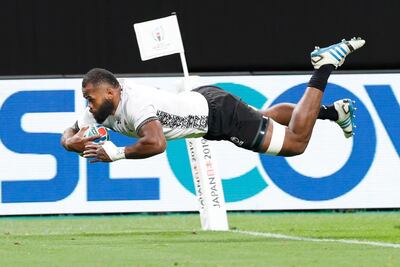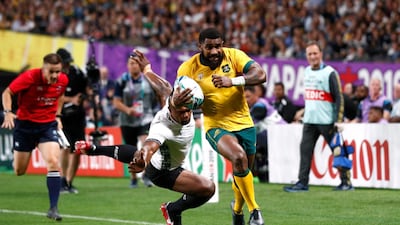What chance, really, have Fiji got? Or, for that matter, any of the Pacific Island nations who give so much to rugby, yet have no realistic chance of ever getting on?
If the scouts from the rich countries don’t get them, then the World Rugby residency rules will.
Or if the eligibility criteria doesn’t, then the fixtures computer will. Or if the fixtures computer doesn’t, then the match officials will.
Australia beat Fiji 39-21 on a captivating second day of the Rugby World Cup. Those are the bare facts, and the only ones that matter.
It was fine fare, too, with the plucky underdogs sticking it to the two-time World Cup winners for a good hour.
There was so much to it to celebrate, everything that is good about rugby. Dig a little deeper, though, and this fixture was emblematic of all that is wrong about the game, too.
In all, 31 points were scored by Fiji-born players. And yet those touched down by Marika Koroibete and Samu Kerevi counted for Australia instead. Tolu Latu, who scored two of Australia’s other tries, was born in Tonga.
When he left Fiji to take up a professional contract in Australian rugby league in 2011, Koroibete’s whole village of Naraiyawa, near the centre of Viti Levu, Fiji’s main island, celebrated.
“I had lost hope,” his father was quoted as saying at the time, revealing that his son had skipped his school exams to try to make a go of becoming a rugby league player.
That move abroad secured his financial future, and – safe to assume – that of his family, too.
Playing Test rugby in a different code for Australia some time in the future probably never even figured in their thinking back then.
Eight years on, Koroibete was playing a key role in denying the country of his birth what would have been a famous World Cup win. Goon on him, but it is a sour take on the fairy tale.
Kerevi, for his part, said in the build up that all his family were going to be supporting the Wallabies – or at least “backing the Fijians in our team”. Even though his Japan-based older brother Josua had helped the Fiji team prepare in the week leading up to it.
Now the job is done, Australia have eight days to recover before they face their next big test, against Wales on Sunday September 29. Fiji? A four-day turnaround before they play Uruguay.
New Zealand, after their clash of the titans against South Africa? Eleven days off. The Springboks themselves? A week.
Sure, their fixtures will bunch up at some point, too. South Africa, for example, have four days between their last two fixtures, but against Italy and Canada? They will probably cope.
Then consider the officiating of the seminal incident of the match, when Reece Hodge, the wing who scored 10 points himself for Australia, blocked Peceli Yato, the rampaging Fijian flanker. Replays showed Reece had made a high tackle, making contact with Yato’s head in the process.

The referee and his assistant were up with play, and well positioned to see the incident.
Given the pace the play was moving at, they could be forgiven for if they wanted guidance from their television colleague. And yet none came. Not to affirm foul play had happened, at least.
Many observers suggested a red card would likely have been shown had the defender been a Pacific Islander, and even the most dispassionate could not square the equation.
Ross Tucker, a South African sports scientist who is part of the World Rugby task force attempting make rugby a safer sport, immediately took to social media to suggest Fiji had, in fact, been wronged.
He ticked off the World Rugby directives for such collisions, and concluded it had been worthy of a red. “I also don't know why it wasn't referred,” Tucker wrote.
There could be retrospective action taken. Hodge could yet face a ban ranging anywhere from three weeks to more than 10. But what good does that do Fiji now?

